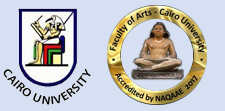عنوان المقال عربي
الآليات المنطقية المستخدمة في تحليل أسماء الأعلام بين النظريات الكلاسيكية والنظرية المعاصرة
Document Type
Original Study
Keywords English
sense, reference, Denotation, General and Singular names
كلمات مفتاحية عربي
المعنى, الإشارة, الدلالة, الأسماء العامة والمفردة
Abstract English
Proper Names have taken the forefront in research on linguistics and contemporary philosophers due to their fundamental function of referring to a person, place, time, or general identification. Proper Names play a crucial role in our understanding of language and its referential nature. Although Proper Names are familiar expressions in natural language, their meanings have remained a subject of debate among various regions, where discussions revolve around a range of questions: Do names have meanings, or do they simply refer to specific things without mediating any meaning? How do names refer to things? Is referring to things the only function of names? Are all linguistic entities names? How can a word signify something associated with a person who refers to another thing? Do expressions like "Barack Obama," "Aristotle's father," and "this dog" all refer in the same way? To answer these questions, four theories have emerged, which can be divided into three major classical theories: John Stuart Mill's theory, Gottlob Frege's theory, and Bertrand Russell's theory, along with the contemporary theory of Saul Kripke. These theories have presented a diverse range of results regarding the nature of proper names. We can provide an initial clarification through a familiar proper name, let's say "Aristotle." According to Mill's theory, it is a "meaningless sign, a reference without meaning." According to Frege, it is a "reference and meaning." Russell's theory suggests that it can be referred to disguised descriptions. As for Kripke's theory, it views proper names, including "Aristotle," as rigid designators. The previous results pose a central problem: What is the nature of the logical mechanisms used in the analysis of proper names by these theorists, which led them to these results? To answer this problem, the researcher dedicates four main sections, preceded by "Preliminary Notes on the Theory" for each section, and followed by a general commentary on the theory. The conclusion encompasses the most significant findings of the study.
الملخص العربي
احتلت أسماء الأعلام مركز الصدارة في بحوث المناطقة وفلاسفة اللغة المعاصرين، نظرًا لوظيفتها الأساسية التي تتمثل في الإشارة إلى الشخص، أو المكان ، أو الزمان، أو التعيين بوجه عام، فأسماء الأعلام تؤدى وظيفة مهمة في فهمنا للغة وإشارتها. وبالرغم من أن أسماء الأعلام تعبيرات مألوفة للغة الطبيعية، لكن ظلت دلالاتها موضوعًا متنازعًا عليه بين العديد من المناطقة، حيث دارت مناقشاتهم حول مجموعة من التساؤلات منها :هل الأسماء لها معاني، أم أنها تشير ببساطة إلى أشياء معينة دون أن يتوسط هذه الإشارة معنى ما؟ كيف تشير الأسماء إلى الأشياء؟ هل الإشارة إلى الأشياء هو كل ما تقوم به الأسماء ؟ هل كل ما في اللغة أسماء؟ كيف لكلمة أن تُحيل إلى شيء ما مرتبط بشخص يُشير إلى شيء آخر؟ هل "التعبيرات" مثل "باراك أوباما " و"والد أرسطو" و"هذا الفيل" تُشير كلها بطريقة واحدة؟ للإجابة عن تلك التساؤلات ظهرت أربع نظريات، يمكن تقسيمها إلى ثلاث نظريات كلاسيكية كبرى هى: نظرية"جون استيورت مل"، نظرية"جوتلوب فريجه" ونظرية "برتراند رسل"، ونظرية رابعة معاصرة هى"نظرية سول كريبكي"، قدمت هذه النظريات مجموعة مختلفة من النتائج حول طبيعة أسماء الأعلام، يمكننا توضيحها مبدئيًا من خلال اسم علم مألوف، وليكن "أرسطو" فهو: "مدلول بلا دلالة، إشارة بلا معني عند "مل". "إشارة ومعنى عند "فريجه"."يمكن الإشارة إليه بوصف متنكر، أما اسم العلم المنطقي"رمز بسيط له معنى عند" رسل". أسماء الأعلام ومنها "أرسطو" فهي معينات صارمة عند "كريبكي". تضعنا النتائج السابقة أمام إشكالية رئيسة هي: ما طبيعة الآليات المنطقية المستخدمة في تحليل أسماء الأعلام من جانب هؤلاء المناطقة، والتي توصلوا من خلالها إلى تلك النتائج؟للإجابة عن تلك الإشكالية خصص الباحث، أربعة مباحث رئيسة، يسبق كل مبحث "ملاحظات تمهيدية حول النظرية"، ويلحق كل مبحث تعقيب عام على النظرية، أما الخاتمة فتشتمل على أهم النتائج التى توصلت إليها الدراسة.
Recommended Citation
Jamil, Issam Zakaria Mahmoud
(2023)
"Logical Mechanisms Used in The Analysis of Proper Names
Between Classical and Contemporary Theories,"
Journal of the Faculty of Arts (JFA): Vol. 83:
Iss.
2, Article 24.
DOI: 10.21608/jarts.2023.214580.1365
Available at:
https://jfa.cu.edu.eg/journal/vol83/iss2/24
Digital Object Identifier (DOI)
10.21608/jarts.2023.214580.1365
Accept Date
2023-04-25
Publication Date
4-1-2023

